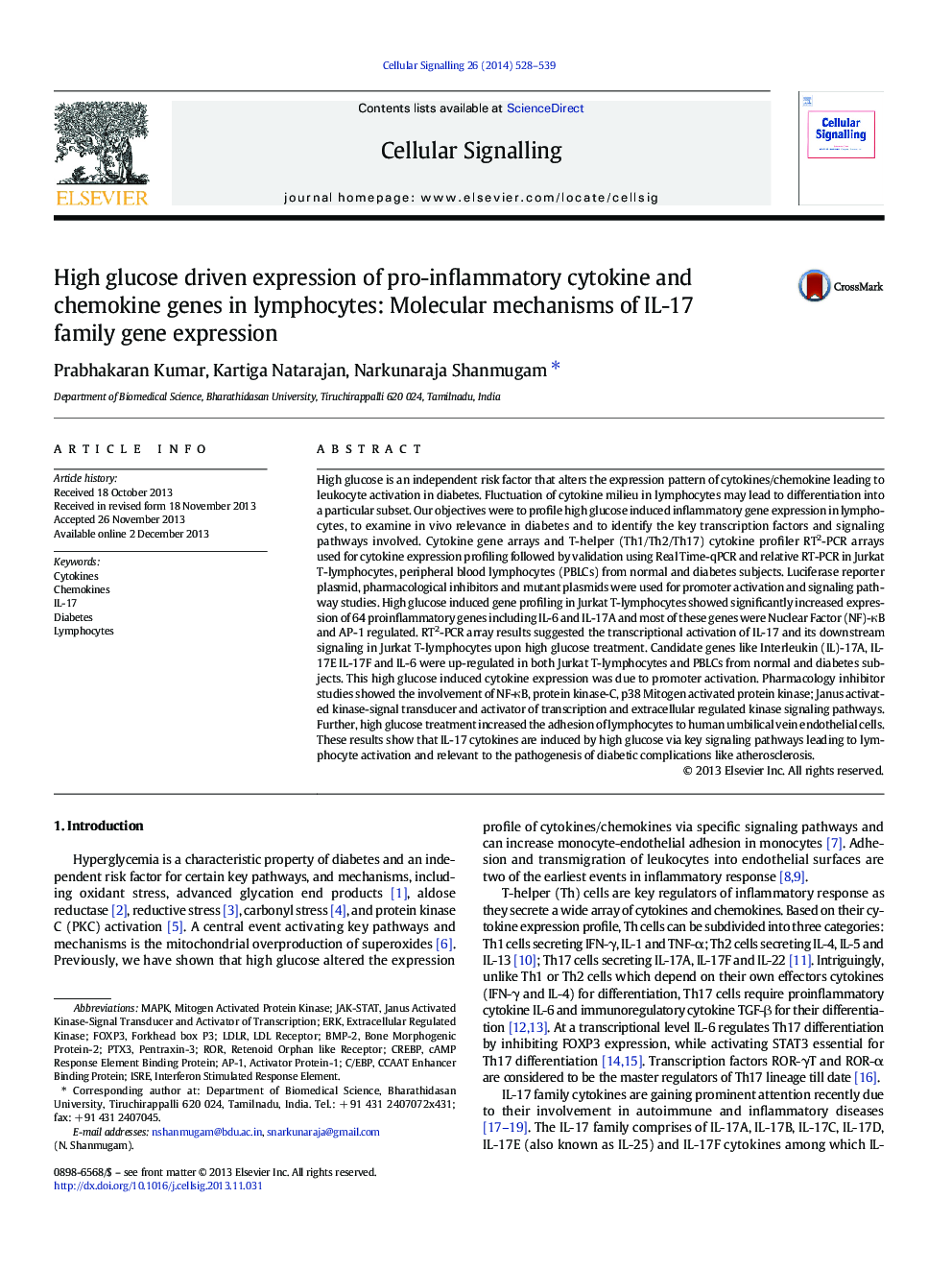| کد مقاله | کد نشریه | سال انتشار | مقاله انگلیسی | نسخه تمام متن |
|---|---|---|---|---|
| 10815280 | 1058465 | 2014 | 12 صفحه PDF | دانلود رایگان |
عنوان انگلیسی مقاله ISI
High glucose driven expression of pro-inflammatory cytokine and chemokine genes in lymphocytes: Molecular mechanisms of IL-17 family gene expression
دانلود مقاله + سفارش ترجمه
دانلود مقاله ISI انگلیسی
رایگان برای ایرانیان
کلمات کلیدی
LDLRJAK-STATIL-17PTX3ISREAP-1CREBPERKBMP-2RORFOXP3C/EBP - C / EBPMAPK - MAPKinterferon stimulated response element - اینترفرون تحریک کننده عنصر پاسخDiabetes - بیماری قندforkhead box P3 - جعبه جعبه P3Cytokines - سیتوکین هاLymphocytes - لنفوسیت هاCCAAT enhancer binding protein - پروتئین اتصال دهنده تقویت کننده CCAATcAMP response element binding protein - پروتئین اتصال دهنده عنصر پاسخ cAMPactivator protein-1 - پروتئین فعال کننده-1bone morphogenic protein-2 - پروتئین مورفولوژیک استخوان 2mitogen activated protein kinase - پروتئین کیناز فعال Mitogen فعال استPentraxin-3 - پنتاکسین-3Chemokines - کرموین هاextracellular regulated kinase - کیناز تنظیم شده خارج سلولیLDL receptor - گیرنده LDL
موضوعات مرتبط
علوم زیستی و بیوفناوری
بیوشیمی، ژنتیک و زیست شناسی مولکولی
زیست شیمی
پیش نمایش صفحه اول مقاله

چکیده انگلیسی
High glucose is an independent risk factor that alters the expression pattern of cytokines/chemokine leading to leukocyte activation in diabetes. Fluctuation of cytokine milieu in lymphocytes may lead to differentiation into a particular subset. Our objectives were to profile high glucose induced inflammatory gene expression in lymphocytes, to examine in vivo relevance in diabetes and to identify the key transcription factors and signaling pathways involved. Cytokine gene arrays and T-helper (Th1/Th2/Th17) cytokine profiler RT2-PCR arrays used for cytokine expression profiling followed by validation using Real Time-qPCR and relative RT-PCR in Jurkat T-lymphocytes, peripheral blood lymphocytes (PBLCs) from normal and diabetes subjects. Luciferase reporter plasmid, pharmacological inhibitors and mutant plasmids were used for promoter activation and signaling pathway studies. High glucose induced gene profiling in Jurkat T-lymphocytes showed significantly increased expression of 64 proinflammatory genes including IL-6 and IL-17A and most of these genes were Nuclear Factor (NF)-κB and AP-1 regulated. RT2-PCR array results suggested the transcriptional activation of IL-17 and its downstream signaling in Jurkat T-lymphocytes upon high glucose treatment. Candidate genes like Interleukin (IL)-17A, IL-17E IL-17F and IL-6 were up-regulated in both Jurkat T-lymphocytes and PBLCs from normal and diabetes subjects. This high glucose induced cytokine expression was due to promoter activation. Pharmacology inhibitor studies showed the involvement of NF-κB, protein kinase-C, p38 Mitogen activated protein kinase; Janus activated kinase-signal transducer and activator of transcription and extracellular regulated kinase signaling pathways. Further, high glucose treatment increased the adhesion of lymphocytes to human umbilical vein endothelial cells. These results show that IL-17 cytokines are induced by high glucose via key signaling pathways leading to lymphocyte activation and relevant to the pathogenesis of diabetic complications like atherosclerosis.
ناشر
Database: Elsevier - ScienceDirect (ساینس دایرکت)
Journal: Cellular Signalling - Volume 26, Issue 3, March 2014, Pages 528-539
Journal: Cellular Signalling - Volume 26, Issue 3, March 2014, Pages 528-539
نویسندگان
Prabhakaran Kumar, Kartiga Natarajan, Narkunaraja Shanmugam,